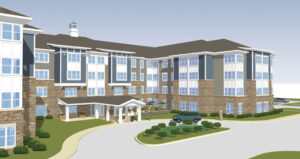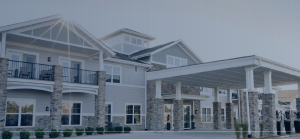The Covid-19 pandemic is changing many aspects of the senior housing industry, including the prospects for new development.
While the long-term ramifications are still unclear, there are early indications the pandemic will make banks more cautious about the sector and create new opportunities for middle-market projects, among other changes.
That’s according to Ryan Haller, an industry veteran who spent several years with Avamere and is now heading up a senior living consulting practice called Orchard Hill Partners. Haller, who has a unique vantage point as a longtime senior housing developer, believes that, while the challenges will be numerous, there will also be some opportunities in the post-pandemic future.
“It’s been enforced yet again in so many conference calls this past week with fellow developers, capital markets, architects, and interior designers that we ought to view this for what it is — a grand opportunity to shape a convergence of many forces the industry was already facing,” Haller told Senior Housing News. “I think sometimes it takes a crisis to be forced into adopting what should have been common sense all along.”
Specifically, Haller believes that the Covid-19 pandemic will ultimately create opportunities for new senior living developments designed for the middle market and for whole-person wellness. At the same time, banks and lenders may be more choosy about senior living projects than in the past.
Senior Housing News caught up with Haller to learn more about how he sees Covid-19 impacting the senior living industry, and what operators can perhaps learn from this and other crises.
The following interview was edited for length and clarity:
SHN: You have said that senior living developers were possibly making some of the same mistakes in the past few years that they made right before the Great Recession. What are they doing wrong, and what should they have been doing all along?
Haller: I think it’s not necessarily an industry-specific topic. It’s more of a macroeconomic topic. What we were seeing a lot is, how do you afford to build development when land prices continue to go much higher in price and commodities continue to go much higher in price? System impact fees continued to go up every single year. The only thing that was not going up was rents, commensurate to everything else.
Many of the developments we look at that traditionally would pencil just would not pencil. I think there was a little bit of an element of greed that most developers were seeing. And you can point the finger as much as you want, but the reality is that, if you can’t lift rents at a commensurate rate as the cost of development and you have a lot of private equity firms having their standard hurdle rates that you cannot meet, it’s pinching.
It just seems as if everyone but senior housing operators were getting greedy in the process. And I’m just hoping that the cost of development comes down because of that. Now, I don’t see any greed going on so much inside the seniors housing space. It’s more of commodities, land.
I’ll give you a great example. I was trying to start a development last year in Bend, Oregon, a very ideal town resort town. We went in and did our pro forma analysis on the development, an assisted living, memory care [community]. And when it was all said and done, we were able to offer negative $3 million for the land. So, that just gives you an example in that market.
The city for example, was asking system impact fees of over $2 million dollars for things like the parks department. Why is a resident that’s in an assisted living memory care [community] impacting the parks? You have people asking for $30, $35 a square foot for land. You have general contractors who are giving you numbers that make your eyes pop out. When all that’s happening, I often will say on my job sites, ‘Did anyone learn anything from 2008, 2009?’ Because back then, people would do anything for any amount of money. And it just seems as if we got further and further away from that moment in time. We had some warning signs back then that there were some cracks. This time around, everything came to a screeching halt literally within a week to two weeks. And I just hope that that’s a lesson for everyone.
How do you think the impact of the pandemic stacks up to what happened during the Great Recession?
Obviously, it’s not the same now, but I see some similar trends. I think it’s a regionalized conversation as well.
I think that the states that you’re starting to see the flattening of the curve … they likely will be the ones that will see the right side of the bell curve earlier. I do think that overall, regardless of [Covid-19’s duration], there will be a level of prudence that you’re going to see until there’s a vaccine that’s fully created and endorsed by the FDA.
Banks, despite their silver tsunami marketing, are going to be reticent to take on a large amount of risk, in my opinion. There has to be some level of comfort that a market study can hold, post-Covid. For investment committees within banks, when you hear about thousands of forecasted deaths in the near-horizon, I think that they understand what that means when you start getting into the numbers, especially if it’s predominantly seniors that are affected.
We had all this marketing saying that we can’t build enough seniors housing, right? Well, what happens when some part of that [resident] population is affected? So, probably in July and even going into the fall conference season at NIC, there’s going to be people that will give us some sidewalk psychoanalysis about it. But I think until you have a vaccine for this, people — primarily banks or developers — are potentially going to see this as a second bounce coming up. And I think they’re just going to be very reticent with their decision-making. And I don’t blame them.
Is this making it harder to access capital for senior living projects?
We have not sensed that yet, and I don’t know if that will be something coming forward. Here’s one thing that’s changed in my world in the past week. We have four projects that are moving along at a pretty nice speed right now. We had a [general partner] provider who last week called us and told us we need to find out who your [limited partner] capital is for your capital stack, and then we’ll commit. Never in my career have I ever heard of that. The GP always comes in first, and you go fill it in with LP capital, right?
I think there’s some people reversing course on that, and maybe that’s a delay tactic that’s going on. I think there’s gonna be some changing of the rules of engagement a little bit when it comes to primary metrics, where you can see someone loan-to-cost numbers changed a little bit, probably more recourse debt out in the market. But I do think it’s a different world we’ll be working under.
That vaccine, really, is the trigger point by which we can go back to as close to what we consider to be normal. If you ask some people, that is 12 to 18 months away. So, I just think that our world will change until then.
You’ve been talking with a lot of your fellow developers in the past few weeks. What are you hearing from them? I assume at least some fear and concern.
It’s a very polarized group. There’s the group that kind of takes the old philosophy of the only thing we have to fear is fear itself. And they’re also calling it very opportunistic. The other side is completely conservative. You know, pencils down, let’s get through this, let’s see how the world looks three months from now.
For our deals that are under [letter of intent] and in diligence right now, we’ve already had some discussions with a couple of our partners where they said, ‘Look, let’s just move the horizon out three months.’ So, if money was supposed to go hard July 15, for now, let’s just move that to October 15, because this is just going to be a dead period until then.
We had a development partner out of Montana that is a low-income housing provider. And on April 1, only 40% of all their tenants across the country paid rent. So he’s come back to us and said, look, we’re still doing the deal, I still own the land, I still want to work with you. I just have to figure out how I’m going to be solvent coming out of this whole deal. Another one of my partners has texted me three times in the last couple days to slowly spell out the word “opportunity” in their texts.
I also think it just all depends on what your capital position was. Warren Buffett’s saying comes to mind: “It’s only when the tide goes out that you learn who’s been swimming naked.” I think the tide receded a lot quicker than what people thought was going to happen. And I think there are some people living on the edge, and we’re all completely exposed. As a result, they may not see the other side of this.
I think that there’s a high capital appetite just because of the demographics involved. I just question how many of those people are going to look at the microeconomics of senior living after this and say, okay, how is the population affected? What’s the solvency of developers? Is the demand as high as what we thought it was? I don’t think we can answer that question probably for at least another three months or so.
Do you think we might see any senior living companies go out of business as a result of the pandemic?
Well, I think it’s a ubiquitous concept across all vertical markets. There’s a company that will remain nameless who was a partner of mine who let go of 850 employees last Friday and is completely shuttering their restaurant division. It was one of nine vertical markets, and seniors housing was one of them, as well. The analogy I would use is like people liquidating their 401k right now. There are also people right now who are making hasty decisions to perhaps prematurely exit.
I do believe that we will see companies of all sizes go out of business. Some of it is how well-capitalized they were. If, for example, you were tied to the hip to [a REIT], and you have ratcheting-up lease rates every single year that already make you a little bit exposed, and if you didn’t have a homerun year, how you were going to be able to make it work? This may just hasten your demise.
You have said you are still bullish on this industry, despite the pandemic. Why?
For one, there’s still a middle-market crisis. That hasn’t changed. If anything, I think Covid-19 was an accelerant. Baby boomers, a lot of them that were hit so hard with their 401(k) accounts during the Great Recession who are just now rebounding, they probably had to add three, four or five years to their retirement plan. A lot of people have been battered again a second time. You have people probably that were outside the middle market range that perhaps are now entering into the middle market.
I think for developers out there that have a great middle-market product … it’s probably going to be the entree at the dinner party.
I think the other opportunity is, we talked for years about how do we bring more services to seniors housing? And what I don’t mean by that is how many more billiards tables or activities, games and amenities that we can bring. But it’s things like, how do you bring more telehealth into the mix? So many seniors housing providers are probably more on the residential side or light health care side. And for them, I think this is going to be an opportunity.
I also think there will be a lot of developers out there, and now there are architects, who say, ‘Okay, now we can prove that a pandemic can happen within weeks, not years or months. How do we make my building friendly to my residents in a similar situation?’ We are in the process of inking our first university partnership, and we’re going to the state board of higher education as a part of that process. And we were told that we needed to update our LOI with a whole entire section about how we are going to incorporate certain amenities within the building — with operator selection, too, by the way — to ensure that if this ever happens again, that we have taken that into account. And that was from a state employee that doesn’t even work in seniors housing, they just thought it was very important that we address that.
So, I don’t think my world has slowed down one bit. I just think that the day-to-day has changed a little bit.
What long-term effects do you see for the senior housing industry on the horizon? Do you think this could change something fundamental about the industry?
I will say yes, but probably not to the same degree that some other asset classes are facing.
We still have the fundamental basic blocking and tackling items that make the industry successful. I think there’s going to be some caution that is thrown into the industry. I think banks are going to be very cautious.
At the end of the day … we know that operators drive all the value on the development that we have, and that’s why I take such a long time deciding what operator I want in a building is because they drive all the value. So I think, coming out of this, one of the statistics that [banks] are going to look at is probably the amount of Covid-19 outbreaks you had in your portfolio, and what you did about it. We’ve had banks and lenders ask us for all sorts of policies and procedures in the past. And sometimes, I think that that’s been a box to check. But now, some lenders and some capital providers may actually start taking a look at how well-prepared you are on your disaster preparedness plan, for example. I think now they are recognizing that it really could bring you down to your knees very quickly
I guess I would summarize all of this by saying: there’s no doubt that this will change the industry. I don’t think we’ll know how much for a year. You’ll start seeing some subtle changes in the meantime. You might see some deals die here and there. But I think that the qualification and process, and some of the rules of engagement, will have some immediate altering as we learn more about the real true net effect of Covid-19 on the industry.
What do you think operating companies should be doing right now to make sure that they are stabilized and in a good spot to weather the pandemic?
All the operators that I work with, their only focus has been on ensuring that their buildings are well sealed and that they can get to the other side of this. When they do get to the other side of this, I think there’s going to be a lot of brainstorming with the operators to determine what went right and what went wrong. For now, a lot of operators that we have meetings scheduled with, they’ve just done a blanket cancellation for the next four weeks.
Right now, we’re very much focused, as we all should be, on the residents and the solvency and the viability of many of these companies. But we’re going to get out of this, and then we’re going to want to develop.
Written by: Tim Regan





